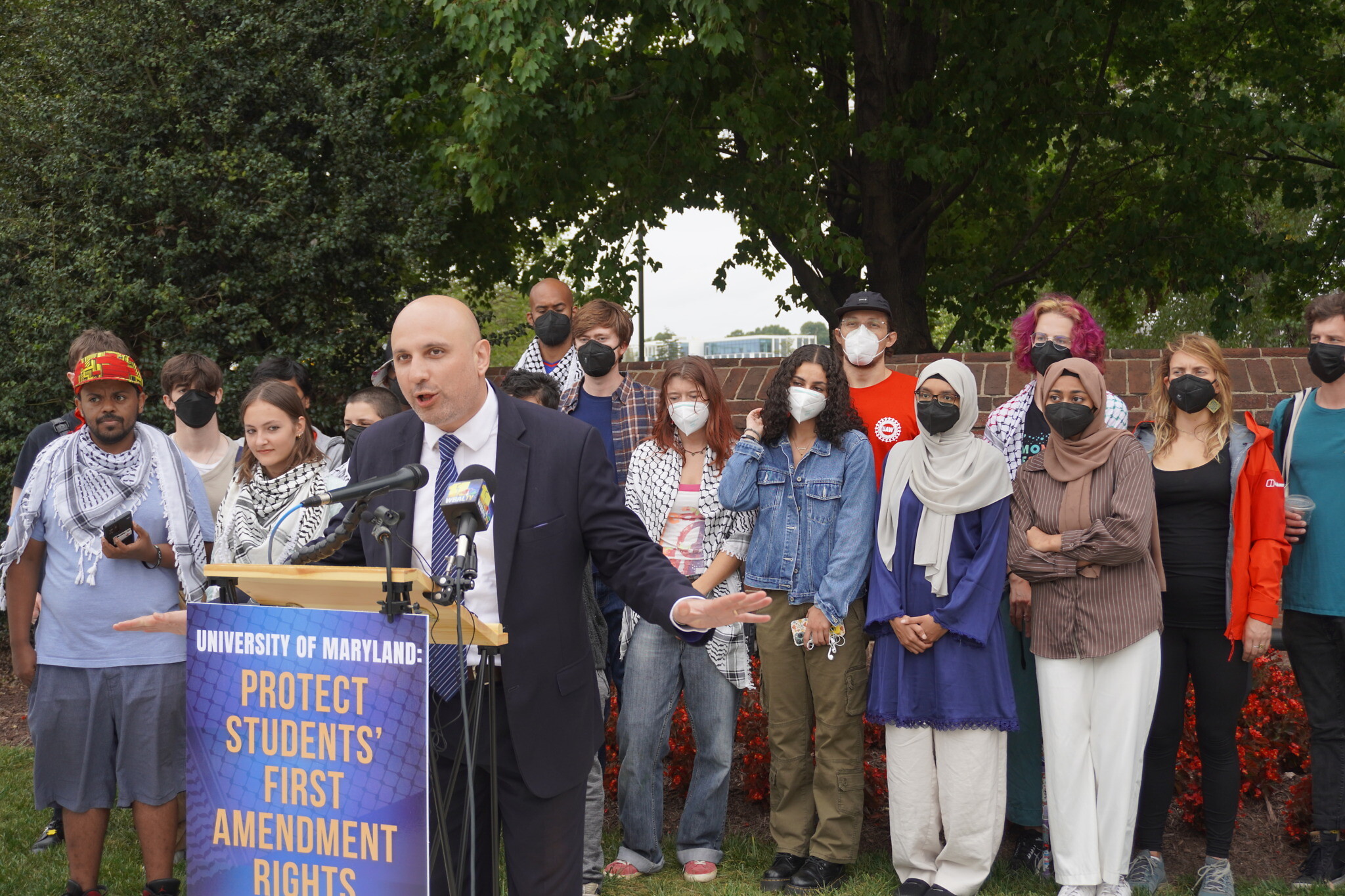The University of Maryland must allow a pro-Palestinian student group to hold a campus rally on the one-year anniversary of the Oct. 7 Hamas attacks after revoking its permit to do so, a federal judge ruled Tuesday.
The ruling by U.S. District Judge Peter Messitte was a rebuke to Jewish and pro-Israel groups at the university in College Park, which had objected to the planned event by the Students for Justice in Palestine chapter being held on a date on which Hamas launched an attack and killed 1,200 people in Israel. They called the event antisemitic and said it should be halted.
“This is a matter of law, not wounded feelings,” Messitte wrote in his opinion. In an opinion that cited past campus protest movements, including those against the Vietnam War and apartheid-era South Africa, he continued, “Free speech as guaranteed by the First Amendment may be the most important law this country has.”
Messitte continued, “The Court will order UMCP to permit the October 7 event to go forward. The law very much inclines in support of this decision.”
The Council on American-Islamic Relations and Palestine Legal, both of which supported SJP’s lawsuit, celebrated the ruling in a release. Representatives for both groups said Israel was committing genocide against Palestinians.
“We’re thrilled with the court’s decision. If the First Amendment didn’t protect students who seek to mourn a genocide and educate the public about it, then it’s meaningless,” Gadeir Abbas, Deputy Litigation Director at CAIR, said in the release.
“Criticizing Israel’s ongoing genocide in Gaza is protected by the First Amendment, period.” said Tori Porell, staff attorney at Palestine Legal.
In a statement, the University of Maryland said it “recognizes, and will abide by, the court’s decision, and will work with all registered student organizers of events requested for October 7.” The school added that it remains concerned about campus safety on the day, which it said was its chief motivation for denying SJP’s permit.
A pro-Israel Jewish parent advocacy group at the school, which had been lobbying the university to stop the event from happening, did not immediately return comment.
SJP initially applied for a permit to host what the group called a “vigil” on the anniversary, which it said it would hold in partnership with anti-Zionist group Jewish Voice for Peace. Saying they were worried that SJP would use the anniversary to celebrate Hamas, pro-Israel Jewish parents and student groups including Hillel petitioned the school last month not to grant the permit. Maryland’s president then announced that “only university-sponsored events that promote reflection” would be allowed to take place on campus on Oct. 7.
SJP sued the university with legal backing from Palestine Legal, CAIR and the American Civil Liberties Union. In court arguments Monday, attorneys for the students argued that, as a university-recognized group, they were entitled to the space and that holding the event on another day wouldn’t have the same impact. Attorneys for the university argued that the event would pose unreasonable security concerns, citing specific threats they had received since news of the permit was announced, and that the school had cause to keep it from happening.
The judge agreed with SJP, concluding that the potential for violence at the event “in no way legally justified the revocation.” Alternate venues, including on different dates, for SJP’s event were also unacceptable, Messitte wrote, because “no channel of communication would be nearly as dramatic as what SJP hoped to pursue on October 7.”
Messitte also specifically addressed arguments from the Jewish parents who opposed the event, who had tried to set terms for Israel criticism they said crossed the line — including any accusations of genocide in Gaza. Even if such comments are offensive, Messitte said, the university should protect students’ rights to express them.
“SJP has picked a particularly controversial date to hold an event to commemorate Gaza War dead, to decry what it terms Israeli ‘genocide,’ and to promote multiple aspects of Palestinian life and culture,” he wrote. “But like them or not, these very terms appear in the media virtually daily. They are expressive of ideas, however vile they may seem to some. There is no reason why they should not be given protection as speech when they are used in the forum of a public university.”
Messitte’s ruling comes as the Oct. 7 anniversary presents a new fault line in a year full of them. Jewish and pro-Israel groups hope to use the day to mourn the Israelis killed by Hamas on the day. Meanwhile, pro-Palestinian groups, including JVP, view the date primarily as the start of Israel’s assault in Gaza that has killed more than 40,000 people to date — and are largely glancing over, or even supporting, the attacks themselves. (Maryland’s SJP and JVP chapters have claimed Israel has killed more than 180,000 Palestinians — a number far above Hamas’s own estimates.)
Protests are expected to abut pro-Israel vigils and demonstrations in some places on Monday, while campuses are bracing themselves for potentially renewed conflict. Maryland isn’t the only school where pro-Palestinian groups are planning events on the day: Vassar College’s SJP chapter is also planning a “vigil” for Oct. 7.
Support the Jewish Telegraphic Agency
Help ensure Jewish news remains accessible to all. Your donation to the Jewish Telegraphic Agency powers the trusted journalism that has connected Jewish communities worldwide for more than 100 years. With your help, (JEWISH REVIEW) can continue to deliver vital news and insights. Donate today.




